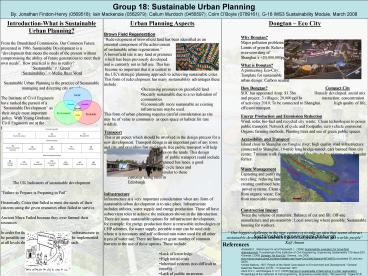SustainableEngineering@Edinburgh PowerPoint PPT Presentation
1 / 1
Title: SustainableEngineering@Edinburgh
1
Group 18 Sustainable Urban PlanningBy Jonathan
Findon-Henry (0569518) Iain Mackenzie (0562979)
Callum Murdoch (0456597) Colm OBoyle (0789161),
G-18 IMS3 Sustainability Module, March 2008
- Introduction-What is Sustainable Urban Planning?
- From the Brundtland Commission, Our Common Future
presented in 1986.
Sustainable Development is a development that
meets the needs of the present without
compromising the ability of future generations to
meet their own needs. How practical is this in
reality? - Sustainable ? Green
- Sustainability Media Buzz Word
- Sustainable Urban Planning is the practice of
Sustainable managing and directing city growth - The Institute of Civil Engineers
- have ranked the pursuit of a
- Sustainable Development as
- their single most important
- policy. With Young Graduate
- Civil Engineers are at the
- forefront of this.
- Urban Planning Aspects
- Brown Field Regeneration
- Redevelopment of brownfield land has been
identified as an essential component of the
achievement - of sustainable urban regeneration.
- A brownfield site is any land or premises
- which has been previously developed
- and is currently not in full use. This has
- become so important that it is central to
- the UK's strategic planning approach to
achieving sustainable cities. This form of
redevelopment has many sustainability advantages
these include - Decreasing pressures on greenfield land.
- Socially sustainable due to a revitalisation of
communities. - Economically more sustainable as existing
infrastructure maybe used. - This form of urban planning requires careful
consideration as site may be of value to
community as open space or habitat for rare
wildlife. - Transport
- This is an aspect which should be involved in the
design process for a new development. Transport
design is an important part of any town and city
and providing fast and hassle free public
transport will help reduce the amount of private
vehicles on the roads. This design
of public transport could include
designated bus lanes, a good network
of cycle lanes and electric trams,
similar to those currently being
built in Edinburgh. - Infrastructure
Dongtan Eco City Why Dongtan?
Major pollution problems Limits
of growth Relieve
over-crowding of Shanghais
20,000,000ppl What is Dongtan? A pioneering
Eco-City Template for sustainable urban design
Carbon neutral. How Dongtan? Compact
City SIIC has appointed Arup 1.3bn
Densely developed social mix and project 3
villages 20,000 ppl by
interaction concentration of activities 2010 To
be connected to Shanghai. high
quality of life efficient transport. Energy
Production and Emmission Reduction Wind, solar,
bio-fuel and recycled city waste Clean
technologies to power public transport Network
of cycle and footpaths, zero vehicle emissions
Organic farming methods, Planting trees and use
of green public spaces. Accessibility and
Transport Island close to Shanghai on Yangtze
river high quality road infrastructure connected
to Shanghai 18-mile long bridge-tunnel cars
banned from city centre 7 minute walk from any
part of the city to bus or tram stop Regular
ferries Waste Management Capturing and purifying
water recycling reducing landfills, creating
combined heat and power systems Clean energy
from organic waste Energy from renewable
sources. Construction Impact Twice the volume of
materials Balance of cut and fill Off-site
manufacture and pre-assembly Local sourcing
where possible Sustainable housing for
workers. Our biggest challenge in the new
century is to take an idea that seems abstract
sustainable development and turn it into a daily
reality for all this worlds people Kofi Annan
SustainableEngineering_at_Edinburgh
- References
- Pediaditi K., Wehrmeyer W. and Chenoweth J.
(2006) Sustainability evaluation for brownfield
redevelopment. Proceedings of the Institution of
Civil Engineering, Engineering Sustainability 159
Issue ES1. - Girardet, (2006) Dongtan, An Eco-City, Geneva,
July 2006. www.wbcsd.org/plugins/DocSearch/details
.asp?typeDocDetObjectIdMTk4MTk (accessed 28
Janurary 2008) - United Nations. 1987."Report of the World
Commission on Environment and Development."
General Assembly Resolution 42/187, 11 December
1987. - Hunt D.V. L. and Rodgers C. D. F. (2005) Barriers
to sustainable infrastructure in urban
regeneration. Proceedings of the Institution of
Civil Engineering, Engineering Sustainability 158
Issue ES2. Pages 67-81

